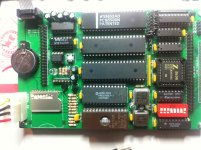uniserver
Well-known member
There was a thread on 68KMLA that originally talked about this board,
it was the board that used age appropriate parts.
Board is not ready yet, They are $20 bucks a piece, he has 4 PCB's left.
Here is his email to me:
--------------------------------------------------------------
Sorry for the late reply.
Yes, there are four of the SCSI to IDE PCBs left. Are you interested in building a prototype? I know the board works well enough to run a basic debug monitor but needs a project lead with enough skills and experience to complete build and test and also work on the firmware.
The PCBs are normally $20 each plus shipping but if there is a project lead volunteer or someone who can bring this to completion, I will send them a PCB for free.
Thanks and have a nice day!
Andrew Lynch - LYNCHAJ@YAHOO.COM
----------------------------------------------------------
I wouldn't be much help on this project,
i bet some of you might be, if you are interested?
it was the board that used age appropriate parts.
Board is not ready yet, They are $20 bucks a piece, he has 4 PCB's left.
Here is his email to me:
--------------------------------------------------------------
Sorry for the late reply.
Yes, there are four of the SCSI to IDE PCBs left. Are you interested in building a prototype? I know the board works well enough to run a basic debug monitor but needs a project lead with enough skills and experience to complete build and test and also work on the firmware.
The PCBs are normally $20 each plus shipping but if there is a project lead volunteer or someone who can bring this to completion, I will send them a PCB for free.
Thanks and have a nice day!
Andrew Lynch - LYNCHAJ@YAHOO.COM
----------------------------------------------------------
I wouldn't be much help on this project,
i bet some of you might be, if you are interested?

